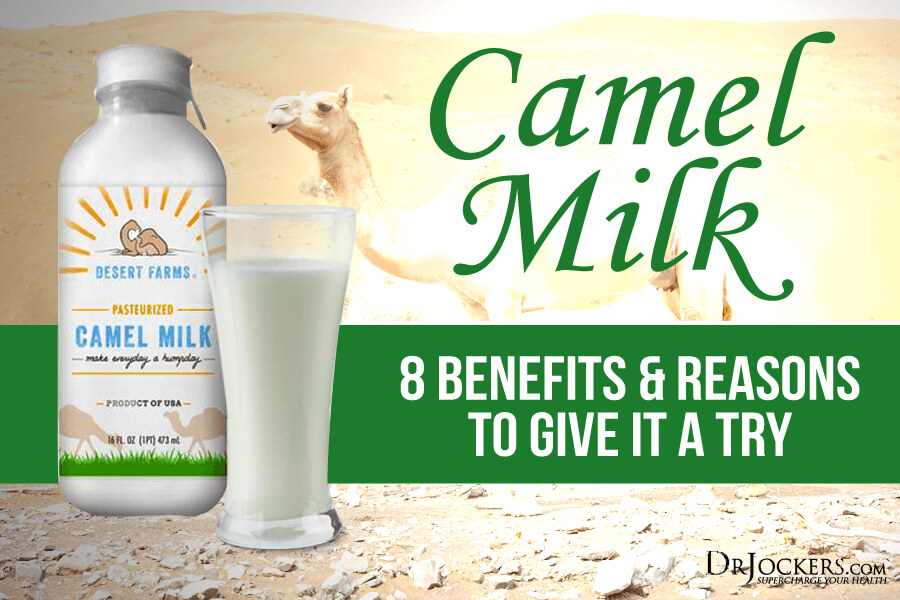 Camel Milk: 8 Reasons to Give it a Try
Camel Milk: 8 Reasons to Give it a Try
If you’re thinking that camel milk seems like something only nomadic desert-dwellers would drink, you’re not alone; however, that couldn’t be further from the truth!
While camel milk may seem foreign to many inhabitants of North America, in the Middle East it’s a dietary staple that numerous people couldn’t do without. In fact, it’s been used for hundreds of years as a medicinal drink in Asian, African, and Middle Eastern cultures, so it’s very well-established in some areas of the world (1).
Even though it’s been around for a long time, camel milk’s smooth, refreshing taste and plentiful benefits have kept it popular to this day. Lucky for us, now Westerners have the chance to get in on the camel-milk secret as it gains popularity in the United States.
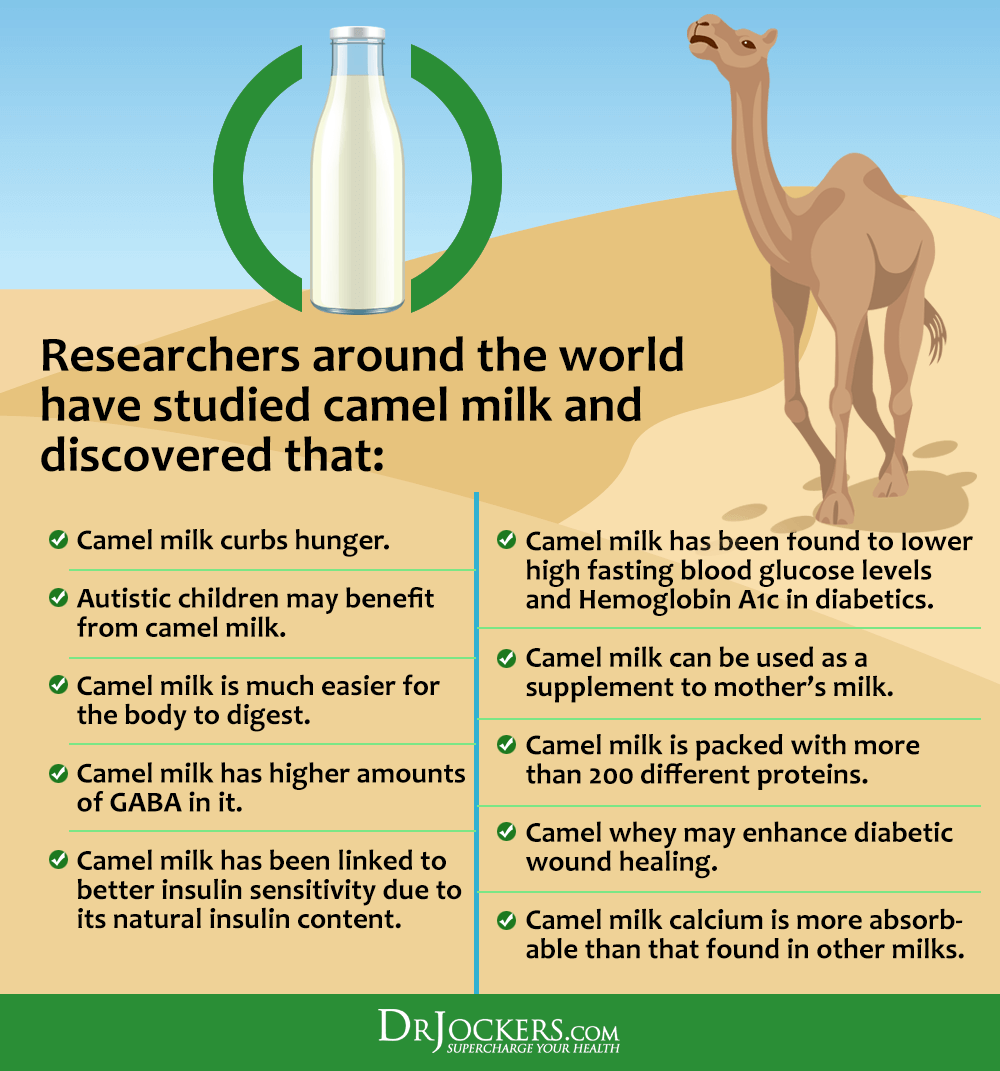
Camel Milk Benefits
There are so many benefits of camel milk that are not well-known. For example, did you realize that camel milk naturally has many similarities to human breast milk, contains prebiotics and probiotics, possesses minerals that may help support gut-health, and more?
This unique milk also is also full of substances that help support immune health, and it’s a source of health-promoting molecules and essential nutrients. Last but definitely not least, many people with a cow milk allergy can drink camel milk without an allergic reaction.
Sounds pretty amazing, right? Keep on reading to find out more about how beneficial this exotic milk is.
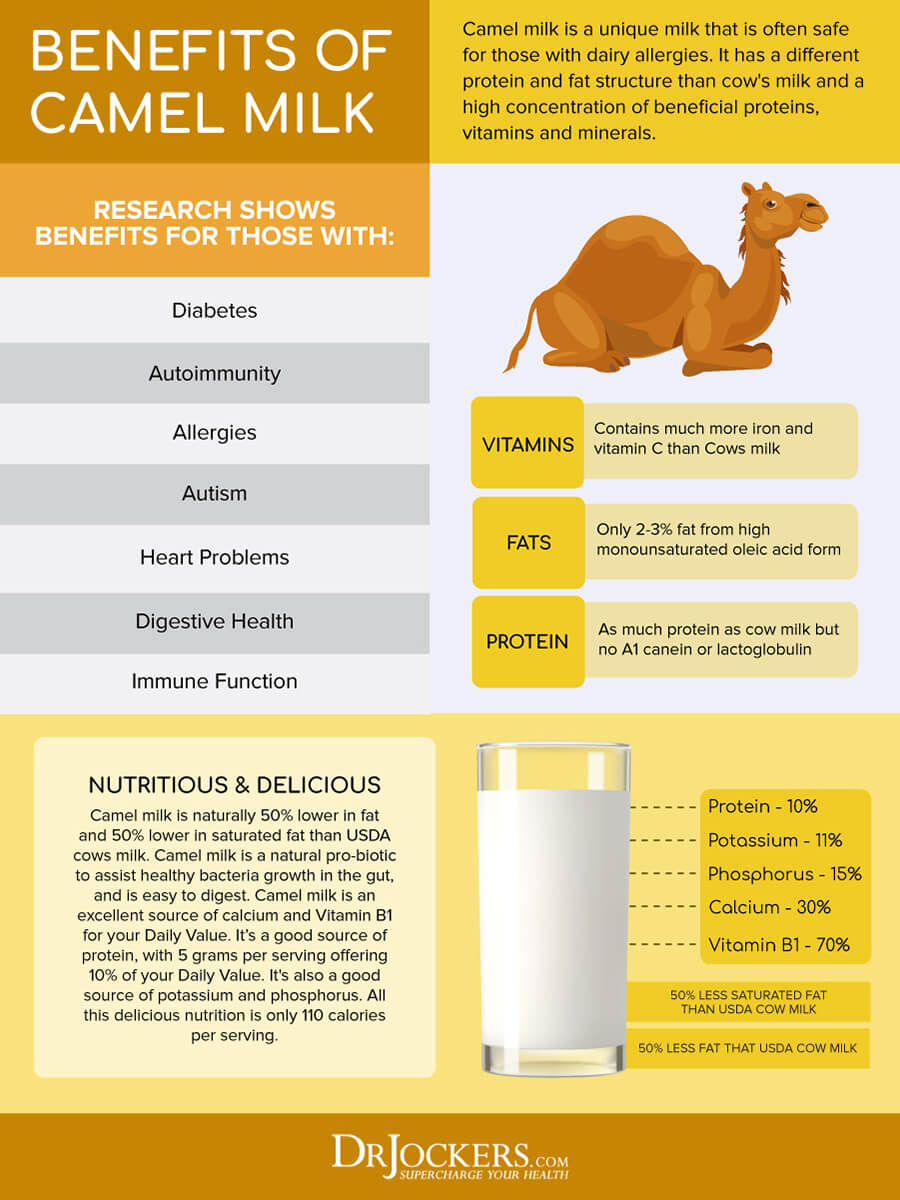
Has Similarities to Breastmilk
Interestingly, camel milk has some of the same components as human colostrum and breast milk.
Colostrum, followed by breastmilk, is produced by a mother in the days after giving birth; its purpose is to provide complete nutrition for her new baby and boost its immune system (2). Like human colostrum, camel milk contains many nutritious substances that can help benefit the immune system in a big way.
One such substance, shared by human colostrum and camel milk, is lactoferrin. Lactoferrin is an iron-binding protein that fights bacterial growth (3). It’s so powerful that it can stop intestinal Escherichia coli.
Another protein that human breast milk and camel milk have in common is lysozyme (4). Lysozyme is commonly found in saliva and is an enzyme that inhibits bacteria by disturbing the membranes of bacterial cells; it also helps maintain healthy gut flora in breastfed babies.
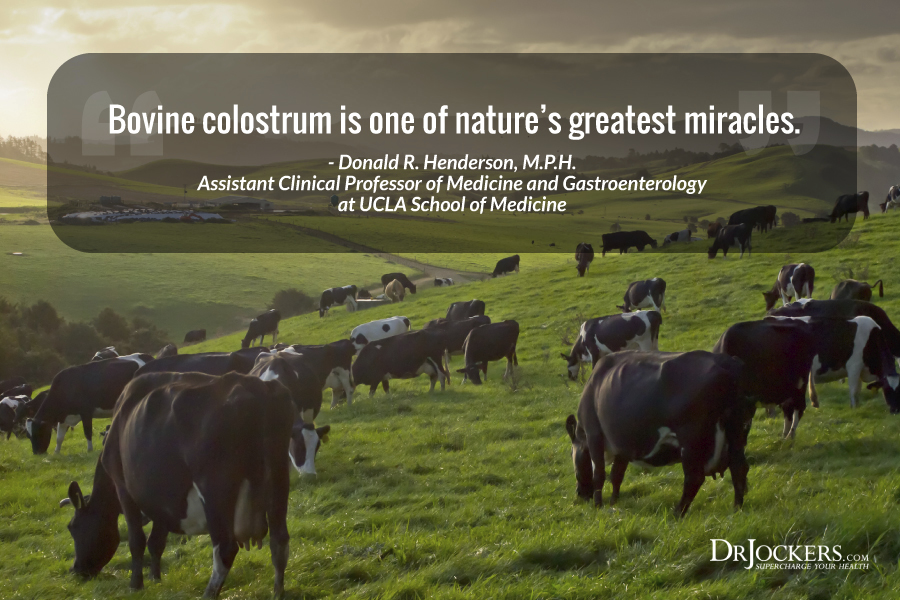
Provides Prebiotics
Prebioticsare another awesome property of camel milk, where they’re present in the form of oligosaccharides (5,6). Prebiotics do the important job of feeding good bacteria and encouraging it to grow in the digestive system, improving health as a consequence.
Additionally, scientists have put forth theories that, as well as helping good bacteria to grow, oligosaccharides can stop the growth of bad bacteria in the colon.
Studies show that prebiotics have been linked to many positive health outcomes, including one study which noted that adding a mix of 90% galacto-oligosaccharides and 10% fructo-oligosaccharides to infant formula helped to prevent eczema in babies (7).
Meanwhile, this study found that overweight adults who drank an alpha-galacto-oligosaccharide prebiotic experienced smaller appetites, less inflammation and ate less food (8).
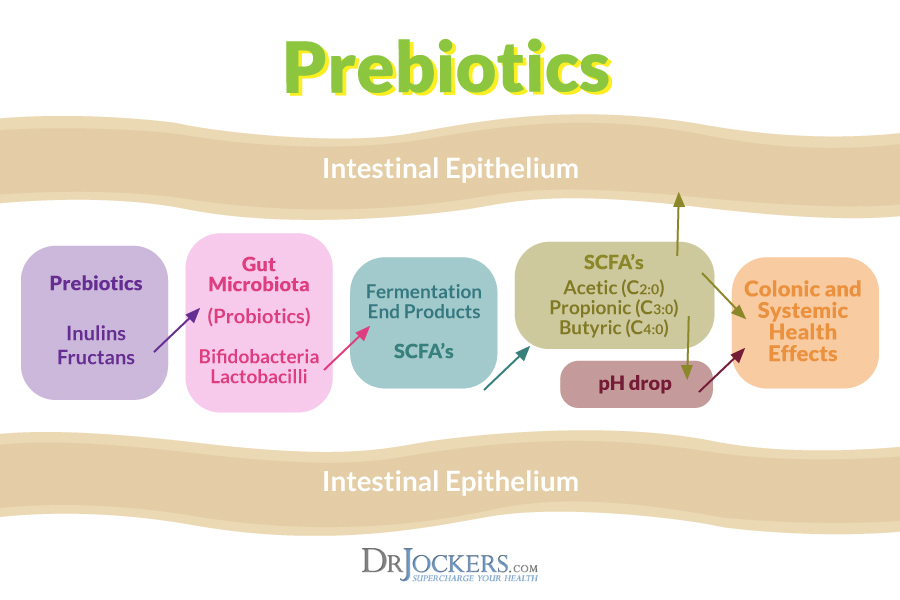
Contains Probiotics
Camel milk also contains a number of probiotics, including Lactobacillus casei, Pediococcus pentosaceus, Enterococcus durans, and Enterococcus lactis, as well as Lactobacillus lactis, Lactobacillus pentosus, and Lactobacillus plantarum (9,10).
Many of these probiotic strains have been studied and found to produce health benefits. One study of E. lactisnoted that this strain of probiotic may help prevent disease (11). This benefit comes from E. lactis’ ability to prevent the growth of certain harmful bacteria and lessen the survival rate of some cancer cells.
Another study looked at a strain of L. pentosusand found that it contributed to gut health by preventing Helicobacter pylori stomach infections (12).
To add to that, in this double-blind, placebo-controlled study, one strain of L. plantarum was reported to ease symptoms of Irritable Bowel Syndrome (13).
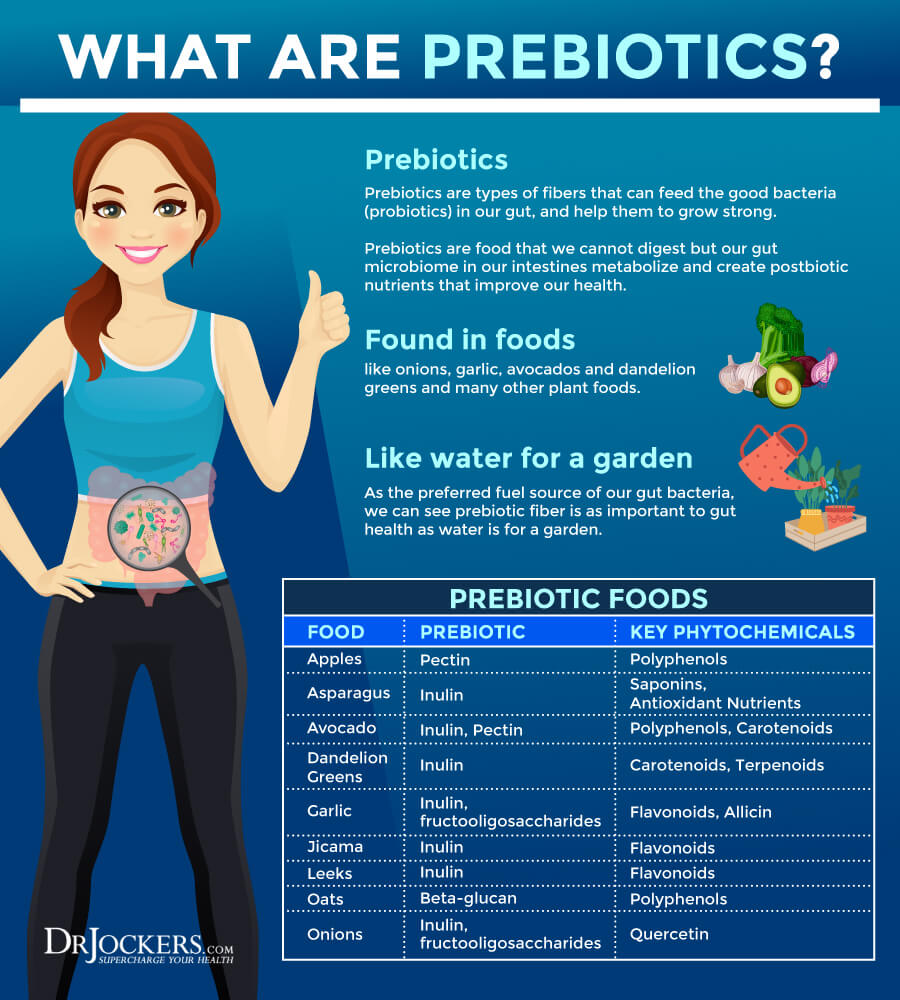
Has Minerals that Support a Healthy Gut
In addition to the benefits listed above, camel milk also contains minerals that may help encourage gut-health.
For instance, a couple of the gut-friendly minerals found in camel milk are selenium and zinc. Studies have reported that when test subjects have healthy levels of selenium they have lower levels of Inflammatory Bowel Disease, including ulcerative colitis and Crohn’s disease (14).
A study from 2011 also gave insight into selenium’s positive effects on gut health (15). In this experiment, researchers found that selenium helped control the microflora in mice. By giving mice dietary selenium, they were able to increase the diversity of bacteria in the intestines and gastrointestinal tracts of the animals being tested.
The zinc in camel milk may also be beneficial to maintaining a healthy gut. One study looked at the importance of zinc in gut health by documenting the effects of zinc deficiency in pigs (16). Researchers noted that the number of digestive enzymes in pigs’ pancreases were directly related to their zinc levels. The study found that even a slight zinc deficiency appeared to have a negative effect on digestion in the animals.

Delivers Immune-Activating Properties
Not only does camel milk have properties that support a healthy gut, it also contains proteins and peptides; these are molecules that help stop bad bacteria from invading, resulting in a stronger immune system (17). These components are what give camel milk its colostrum-like benefits.
Peptides in camel milk were reported to have antioxidant (cancer-fighting) properties in this 2015 study (18). During testing, researchers found two new peptides in this milk which appeared to help fight oxidative stress. Another study demonstrated the antioxidant effects of the YY-11 peptide found in camel milk (19).
What’s more, there’s also evidence that peptides may help make the immune system stronger, especially in older people (20).
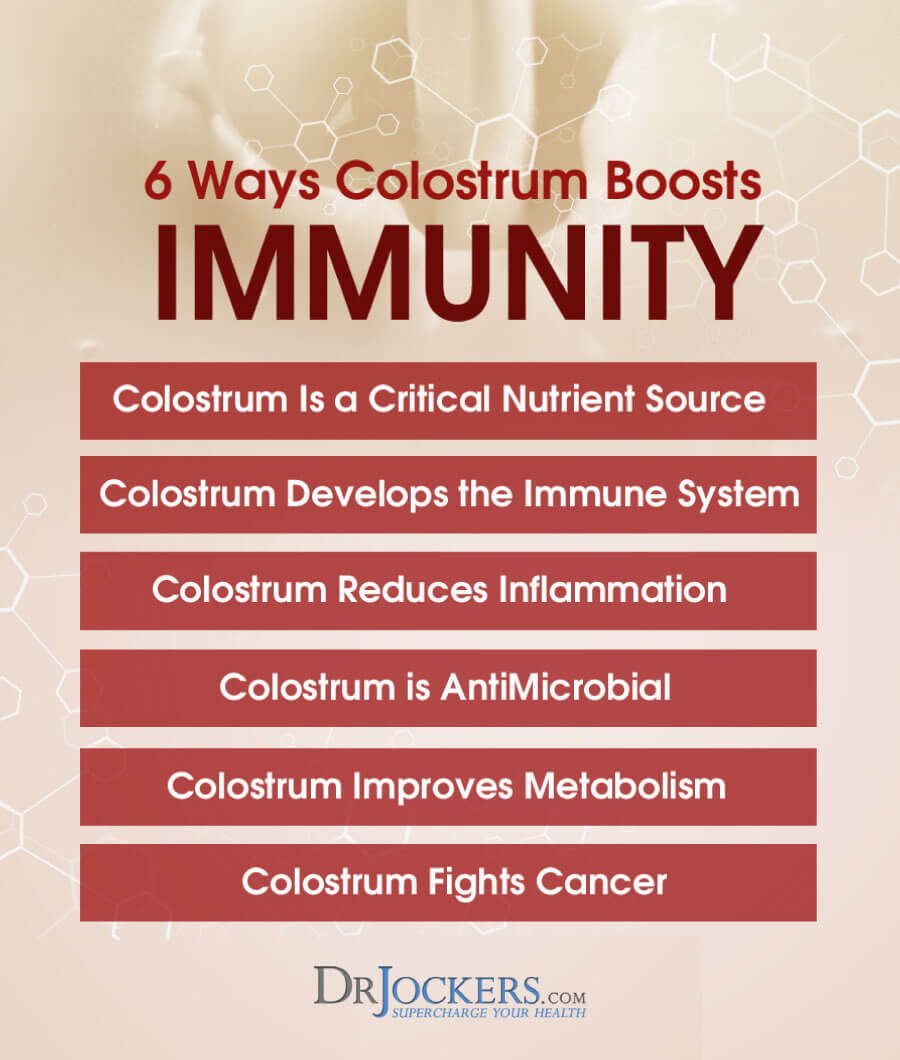
Lactoferrin
As for the proteins in camel milk, there are many with health-promoting properties. For instance, lactoferrin is an important protein that can help fight off harmful bacteria and it’s also reported to have antioxidant (cancer-fighting) properties (21).
Some scientists think that part of the reason lactoferrin has such great anti-microbial properties is because of its peptides, lactoferricin and lactoferranpin, which produce strong anti-fungal, anti-parasitic, and anti-bacterial activity.
Interestingly, the amount of lactoferrin in camel milk has been found to be 30-100 times greater than it is in milk from other animals.
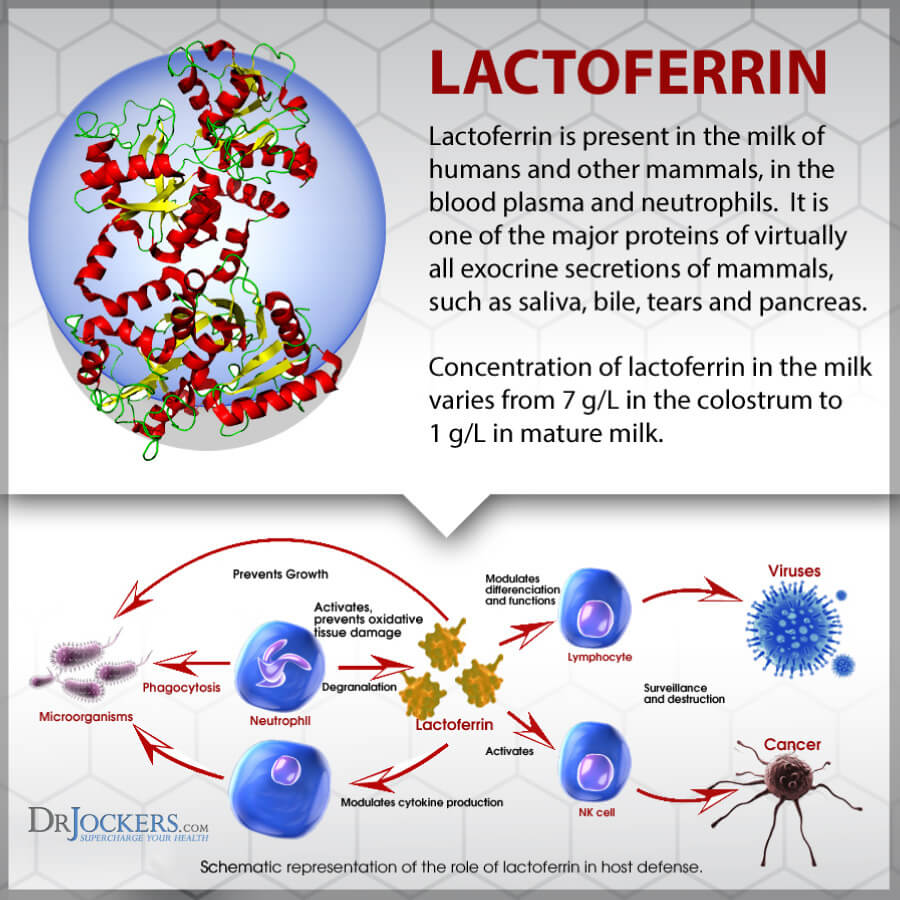
Lysozyme
Another protein, lysozyme, has been found to help disintegrate the cells of various bacteria, including Micrococcus lysodeikticus and E. Coli. Lysozyme is also found more abundantly in camel milk than in cow milk.
Immunoglobulins, also known as antibodies, are protein molecules that strengthen the immune system by fighting off disease-causing bacteria (22). The immunoglobulins found in this milk have even been reported to help interrupt the life-cycle of HIV-1, the most widespread type of HIV in the world.
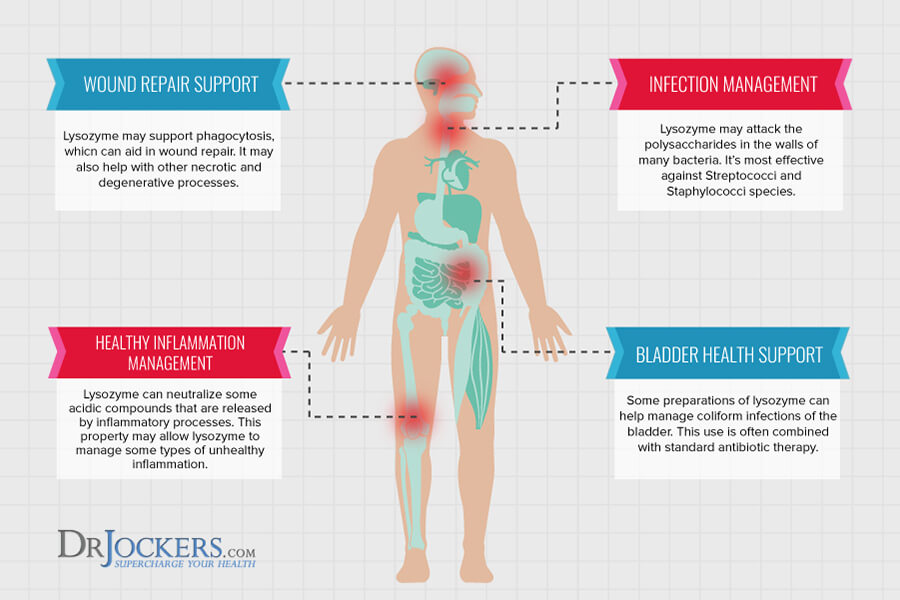
Provides Health-Promoting Molecules
Along with its other helpful properties, camel milk provides many additional health-promoting molecules.
For instance, lactophorin is a protein found in camel milk. This molecule is thought to keep lactating humans and animals from getting mastitis and also help discourage respiratory and gastrointestinal infections in breastfeeding children.
Another wholesome substance found in human and camel milk is lactoperoxidas. This glycoprotein has important antibacterial actions that may help encourage a strong immune system. Specifically, lactoperoxidas from camel milk has been found to discourage the growth of E. coli, Staphylococcus aureus, and Salmonella typhimurium.
Serum albumin is also a beneficial molecule in camel milk. It’s one of the major proteins that make up blood serum, and it’s also found in all bodily secretions, including milk. Having adequate levels of serum albumin is thought to be an important marker of health (23).
Alpha-lactalbuminis a protein that makes up 25% of the proteins in breast milk, and it’s also found in camel milk (24). It’s thought to help with mineral absorption, and has been reported to help decrease the rates of intestinal E. coli infections in baby rhesus monkeys.
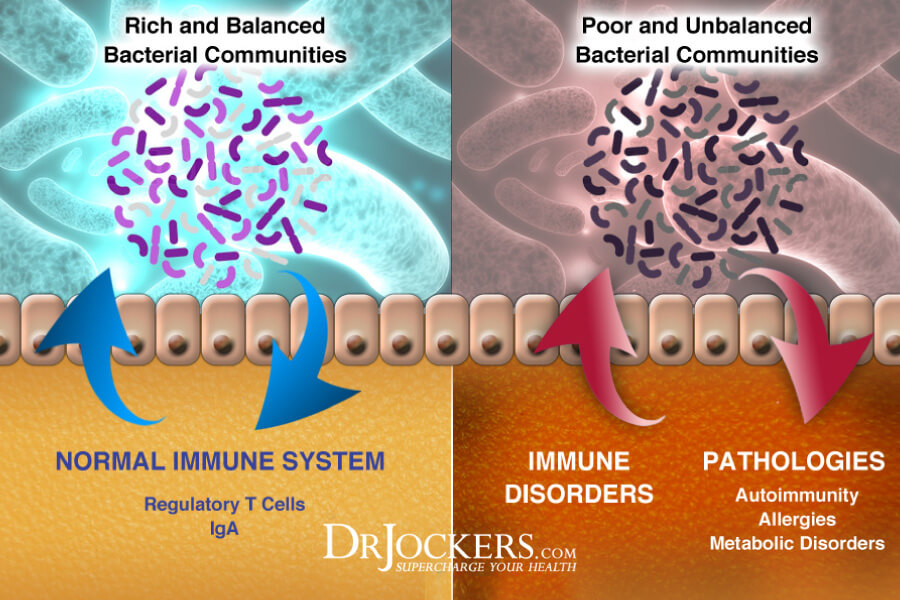
Contains Essential Nutrients
Making sure you get all of the essential nutrients that your body needs on a day-to-day basis can be challenging, and that’s one of the reasons camel milk is so helpful. One cup of camel milk, like this variety from the Desert Farms company, delivers many important proteins, minerals, and vitamins, to help you meet your nutritional needs. Take a look below to see exactly what kind of nutrients are in camel milk.
Protein – one cup of camel milk provides 10% of the recommended daily intake of protein. Protein is extremely important for staying healthy, as it helps to make your blood, hair, connective tissue, and more. The World Health Organization recommends that healthy adults get .75 grams of protein every day for each kilogram of body weight. That means drinking camel milk is a great way to get a chunk of your daily protein.
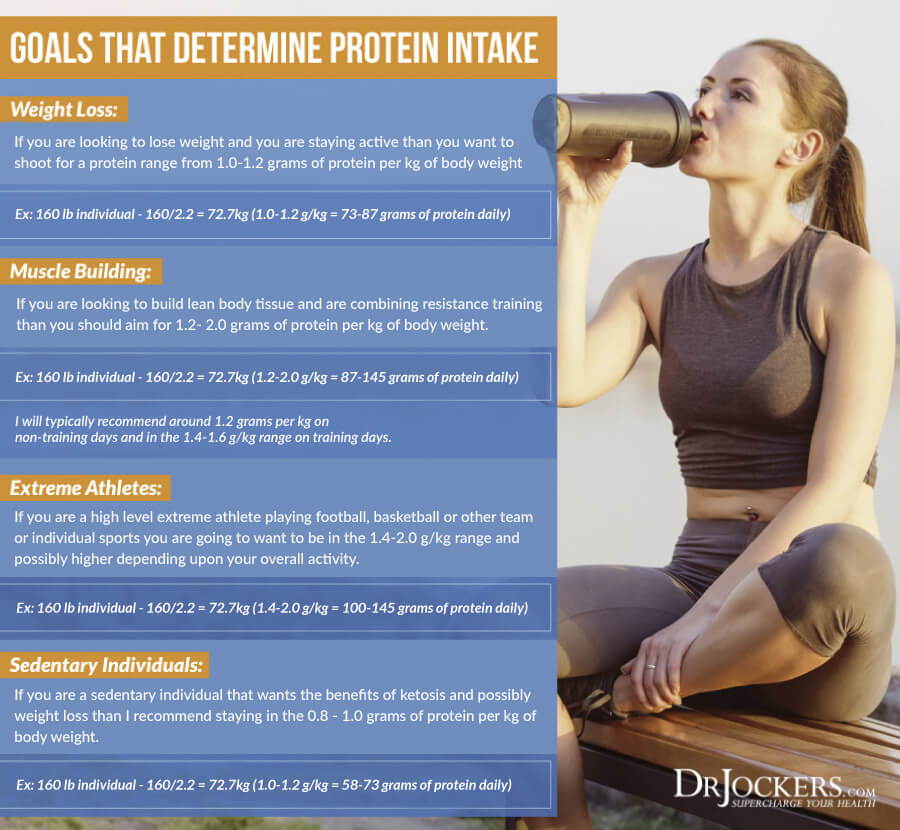
Camel Milk Nutrition (Continued)
Potassium – you can get 11% of your daily recommended intake of potassium through one cup of camel milk. Potassium is very important for maintaining a healthy heart rhythm and for helping nerve and muscle responsiveness. For healthy adults, the National Institutes of Health recommends a daily potassium intake of 4700 mg/day.
Phosphorus – camel milk provides 15% of the daily recommended phosphorus intake in one cup. It is the second most commonly found mineral in the humans, and it helps the body make the protein that’s needed to keep cells healthy. This nutrient also aids in heart health, kidney function, and is an important part of what makes teeth and bones. It’s recommended by the Canadian government that healthy adults get 700 mg/day of phosphorus.
Calcium – one cup of camel milk provides 30% of the daily recommended intake of calcium. One of calcium’s most important roles is in maintaining strong bones and teeth. Interestingly, 99% of calcium in the body is found in a person’s teeth and bones, and it’s actually the most common mineral found in humans.
Calcium is also important for helping blood vessels and muscles function properly and do things like expanding and contracting. In addition, it’s very important to get enough calcium in order to prevent osteoporosis, especially if you’re an older woman. The Canadian government suggests that healthy adults ages 19-50 should get 2500 mg/day of calcium.
Vitamin B1 – With just one cup of camel milk you’ll get 70% of the daily recommended intake of vitamin B1. Thiamine (another name for vitamin B1) helps the body turn carbs into energy, assists with nerve signals, and aids in muscle contractions.
A deficiency in Thiamine can cause short-term memory loss, weight loss, confusion, muscle weakness, and heart problems, so this vitamin is very important. To keep levels of Thiamine at an ideal level, the National Institutes of Health recommend that healthy adult males take 1.2 mg/day and healthy adult females take 1.1 mg/day.
The list above contains just some of the beneficial nutrients that are in camel milk – This study found that camel milk also contained zinc, manganese, copper, and iron (25).
Provides a Cow Milk Alternative
For people with a cow milk allergy (CMA), it can be hard to find a good alternative milk that won’t cause an allergic reaction and will still taste great. Luckily, for many people, camel milk may be able to help.
In this 2011 study, children with a cow milk allergy (CMA) were tested to see if they could tolerate camel milk (26). Researchers found that 80% of children tested were not allergic to camel milk, despite being unable to tolerate cow milk. These interesting results are backed up by another study that presents camel milk as an alternative for people with a CMA.
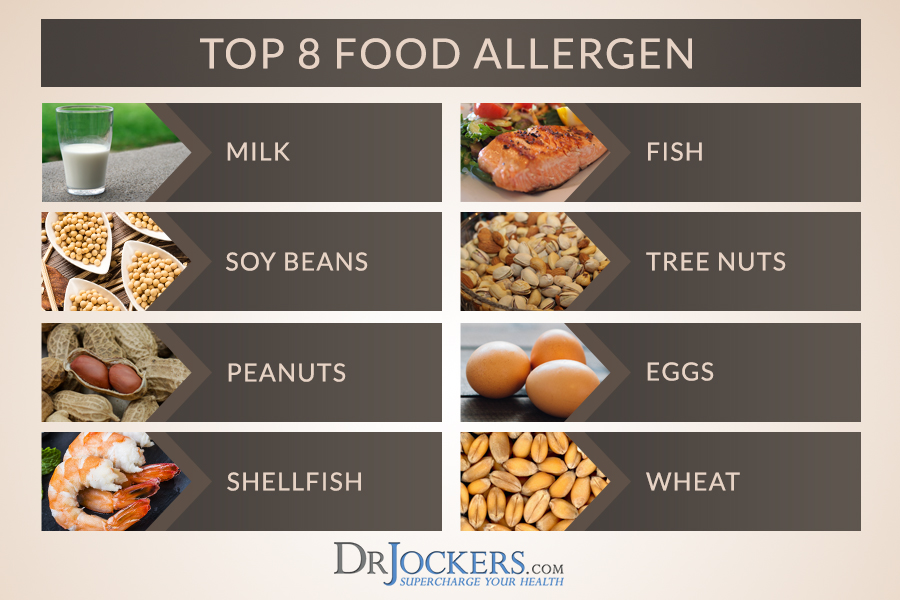
Allergenicity
This study tested children who were allergic to cow milk to see whether they could tolerate goat milk or camel milk with no allergic reaction (27). In fact, researchers found that drinking camel milk is likely even safer than drinking goat milk for those with allergies. The study found that 63.2% of children who had a CMA were also allergic to goat milk, but only 18.4% of those same children tested positive for a camel milk allergy.
It’s thought that part of the reason camel milk is tolerable for people with a CMA may be the absence of a major allergen found in cow milk – namely beta-lactoglobulin.
*Note: The findings above are very promising for those living with a cow milk allergy, but it’s important to remember that in both studies some children with CMA were allergic to camel milk as well. Therefore camel milk is not a solution for everybody with a CMA. Please consult a physician before trying this if you are allergic to cow milk.
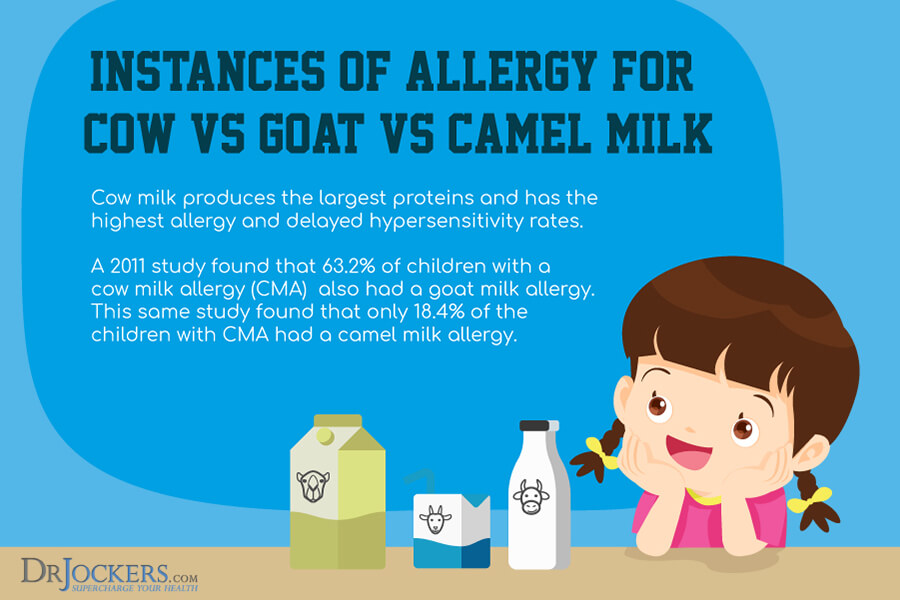
Where to Buy Camel Milk
While most people won’t find camel milk sitting next to the cow milk in their local store (at least not yet), it’s actually not that hard to get a hold of.
The best (and least expensive) source I’ve found for camel milk is the Desert Farms brand that is available for shipping anywhere in the continental US and Canada. In fact, after researching the milk and where to purchase it, I negotiated a 15% discount from them (code: DRJOCKERS)
At Desert Farms– they make it extremely easy to order online and have the milk shipped straight to your front door.
You can even try their 7 day RISK-FREE Trial
Also, Desert Farms camel milk comes to you non-homogenized, in its most unrefined state – this helps keep the milk smooth and sweet tasting while preserving all of the goodies (something you won’t find in store-bought milk).
Family Farms
What’s more, you can you can feel good about supporting their business. Desert Farms partners with family camel farms across the United States to bring you wholesome, freshly frozen camel milk. They put an emphasis on sustainable production and sourcing milk from animals that are treated well.
Desert Farms’ camel farmers focus on recycling, reducing production waste, and conserving their use of energy and water so they can minimize their carbon footprint.
As for Desert Farms’ animals, they live in herds that have an average size of six (some herds are smaller and some larger). Their camels are seasonally grass fed on organic pasture for a minimum of four months out of the year. When they’re not in the pasture, they eat non-GMO, organic, vegetarian feed. Animals can also access outdoor areas with sunshine and space to exercise all year long, and they’re not given added hormones.
Camel Milk Products
If you’re thinking camel milk sounds pretty great, you may want to take a look at some of Desert Farms’ other camel milk products. They also offer kefir, as well as soaps and beauty products containing camel milk.
While it might still seem unusual to trade in your routine milk for camel milk, there are so many reasons to try it. And remember you don’t have to go cold-turkey – you can start by adding a small amount of camel milk to your diet. When you do, you’ll be drinking in so many beneficial nutrients, and your body will be sure to thank you!
*Note: Information provided in this post should not be used to make nutritional or medical decisions. Pregnant and lactating women may require different amounts of nutrients than those listed above. It’s always a good idea to talk to a doctor about how to best meet your nutritional needs before making any changes.
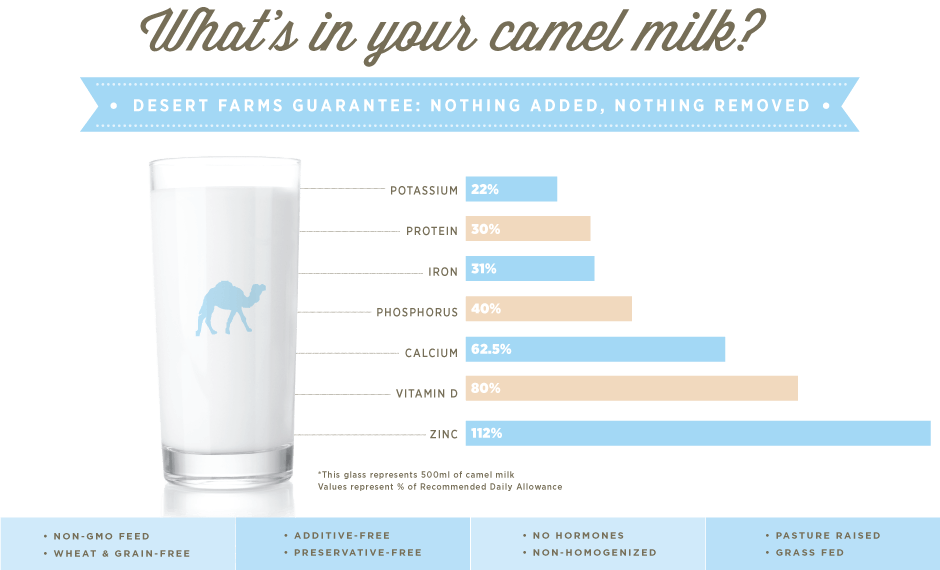
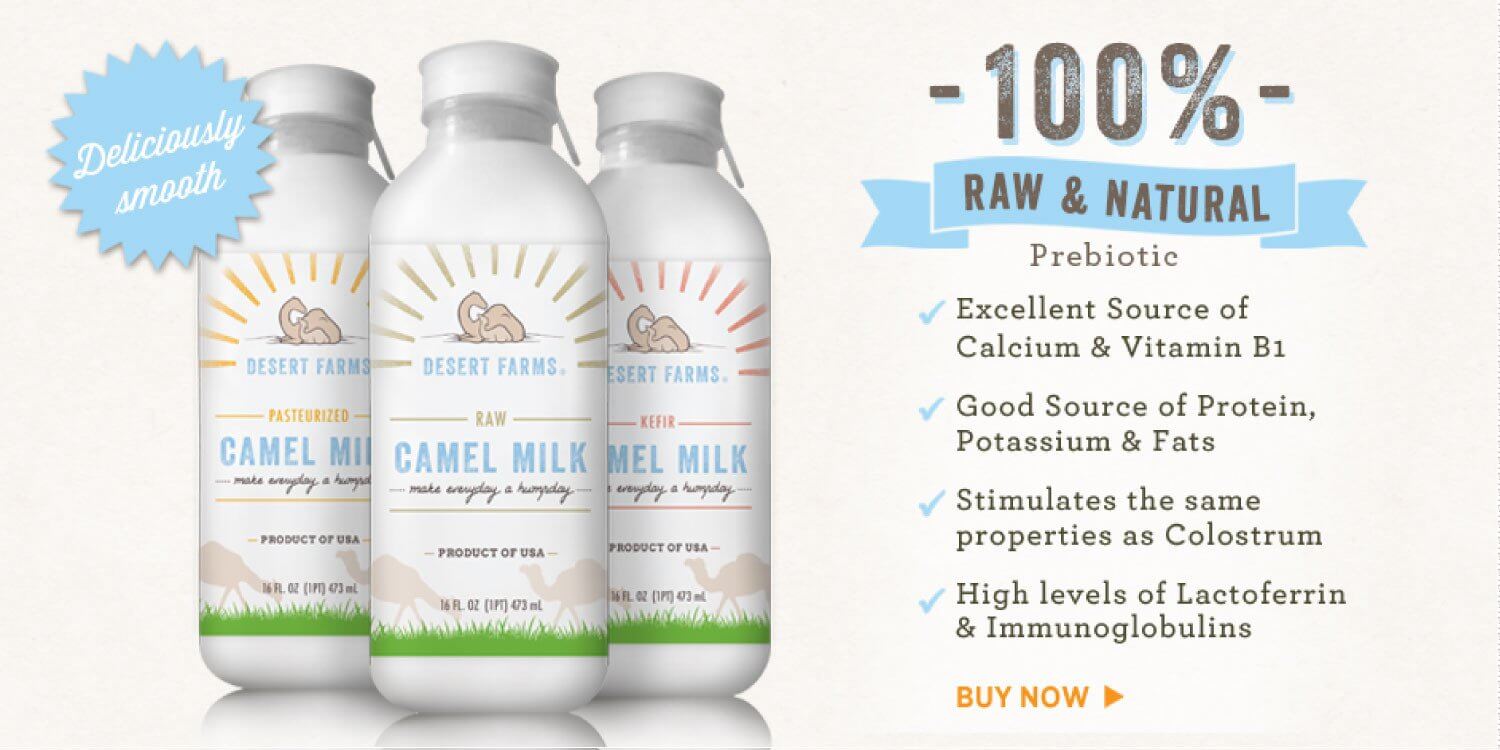

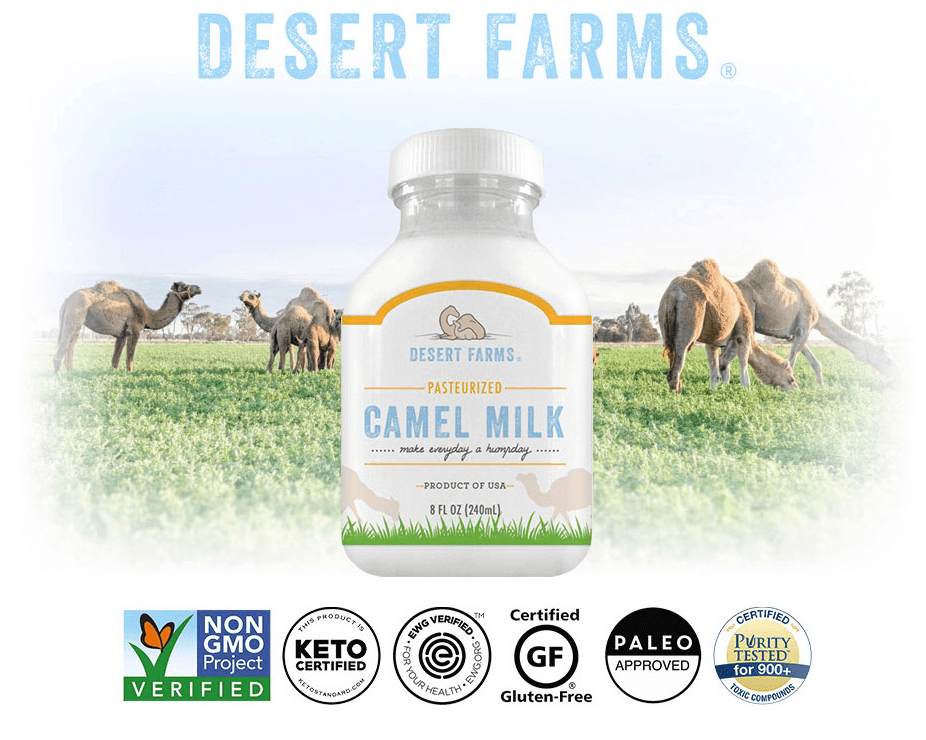



Is Camel milk considered a Kosher food? I try to avoid those prohibited foods.
Here is an answer from the Desert Farms website:
Is camel milk kosher?
Camel Milk is not kosher according to Jewish law. The Jewish law requirement is that an animal must have a cloven foot and chew their cud; camels do not have a cloven foot. Both criteria must be met for an animal to be considered kosher. However, a Rabbi may honor exceptions to this rule when there are health issues. Contact your local Rabbi for more information.
This is credible but how can one get this milk
Check out the link in the article to Desert Farms Camel Milk.